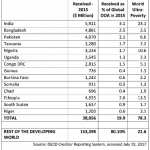Behavioural Nudges: Mildly Paternalistic or a Threat to Economic Justice for the Poor?
Behavioural “nudges” involve the use of insights from behavioural sciences to steer human behaviour. They are increasingly seen by governments as a cheap and effective way of achieving social goals in a time of austerity. Both the Obama administration and the UK coalition government under David Cameron set up “nudge units” at the heart of government.
Proponents like Richard Thaler and Cass Sunstein, in their 2001 book “Nudge,” argue that nudges are “welfare promoting but choice preserving” because they steer individuals toward choices that are better for them while preserving individual autonomy. This is known as libertarian paternalism. Indeed, some familiar applications seem, on the face of it, quite innocuous (such as placing healthier food at eye level in supermarkets, or auto-enrollment in pension schemes).
Debates about nudge in the Global North thus far have focused at this individual level: on whether nudges are acceptably or unacceptably paternalistic – in other words, whether they undermine individual autonomy. An equally important but less examined question is to what extent a “nudge world” – a society in which nudging policies are widely adopted – can be a just one.
Nudges and development
Behavioural approaches have found their way into international development policy and practice most notably through the influence of the 2015 World Bank’s flagship annual World Development Report; “Mind, Society, and Behaviour.”
This report draws from behavioural economics the distinction between two systems of thinking – automatic and deliberative – arguing poor people rely more heavily on automatic decision-making. In a nutshell, it argues poor people are poor because they tend to make the wrong decisions. With poverty rendered a behavioural problem – rather than, for example, the outcome of structural inequality and disadvantage – interventions targeting individual behaviour and choice are promoted as the most effective and cost-efficient.
In marked contrast to the use of nudge in the Global North, however, policy discussions about the use of nudge techniques in development interventions in countries of the Global South are framed almost entirely in instrumental terms around questions of effectiveness.
The “behavioural turn” in development coincided with the emergence of a new global development agenda, in the aftermath of the global financial crisis, which Toby Carroll has called “deep marketisation.” Following the logic of late capitalism, a market opening is now viewed as “the only route via which development can proceed.” Key actors are the World Bank’s private sector arm, the International Finance Corporation (IFC) and “philanthrocapitalists“ like the Bill and Melinda Gates Foundation and Omidyar Network (a for-profit foundation led by Pierre Omidyar, founder of eBay and PayPal). In this era, terms like “good governance” and “institution-building,” staples of the “post-Washington Consensus” in the 1990s through to the early 2000s, have been superseded by “access to finance” and “financial inclusion.”
The global networks of actors, institutions and practices evolving around digital financial inclusion as a global development effort reflect this deep marketisation agenda. The unbanked in the developing world, now accessible via their mobile phones, are viewed as an untapped market and new risk frontier for global finance. Meanwhile, a big data revolution enabling bulk collection of behavioural data has created opportunities for an emerging fintech sector to develop disruptive technologies to pry open these new markets, notably through innovations in alternative credit scoring. It is in this context that the significance of a refocusing of development practice on shaping individual market behavior can be more fully understood.
What kind of ‘nudge world’ is digital financial inclusion?
Central to the fintech revolution are experiments in alternative credit scoring; using behavioural data harvested from online patterns of activity known as digital footprints.
A prime example is Cignifi Inc., whose homepage declares: “Cignifi transforms mobile behaviour into financial opportunity.” Cignifi is an Omidyar investee and is headed by a former IFC director. Neither a finance nor telecoms company, its core product is a proprietary algorithm for creating credit scores for mobile users without a credit history, from patterns of calls and text messages. Many of its projects are in African countries, where it partners with telecom and financial firms to extract personal data and convert it into “credit insights.”
Other fintech startups are experimenting with online games, quizzes and even psychometric testing as ways to create digital footprints for those with no credit history. Through these processes of credit scoring, unbanked people are constituted as a new source of value, and segmented into behaviour-based “risk categories” of borrowers as the basis for more targeted marketing.
As Isabella Kaminska explains: “the only way financial technology can drive financial inclusion is by de-risking people who would otherwise be too risky to lend to” and “this means capturing their data and re-using it in a way that can change or condition customer behaviours, or alternatively provide information flow to the lender for risk-management purposes.”
What kind of “nudge world” is being created in the name of financial inclusion? Rob Aitken argues that “there is a coercive kind of entrepreneurialism associated with these efforts to score the credit invisible.” A distinctly extractive language of “mining” and “prospecting” for borrowers, used by fintech firms and their philanthropic investors, belies the popular inclusion narrative.
Much of the policy debate to date has tended to highlight the potential for digital financial inclusion in the fintech era and how it can be enabled. At the same time, these new financial technologies and the data that they produce – which are proprietary and thus shielded from scrutiny – raise new governance and accountability questions that call for wider public debate.
This article is based on an invited contribution to the panel “Financial Inclusion & Its Role in Delivering Economic Justice,” convened by Lesley Sherratt of Kings College London, at the first Kings Transnational Law Summit in April 2018.
Sally Brooks is a social researcher and honorary fellow at the University of York, with over 25 years’ experience of research and practice within the international development sector.
Image credits: Max Pixel and Good Free Photos.



